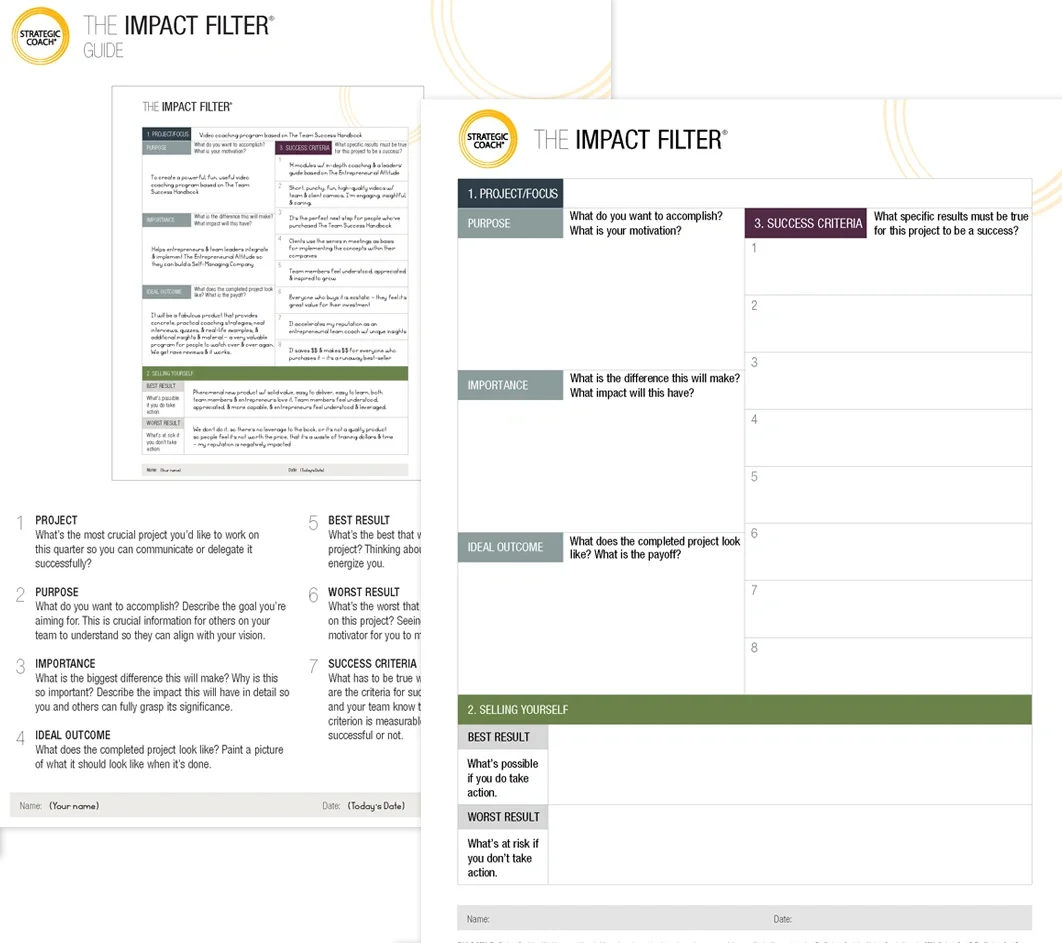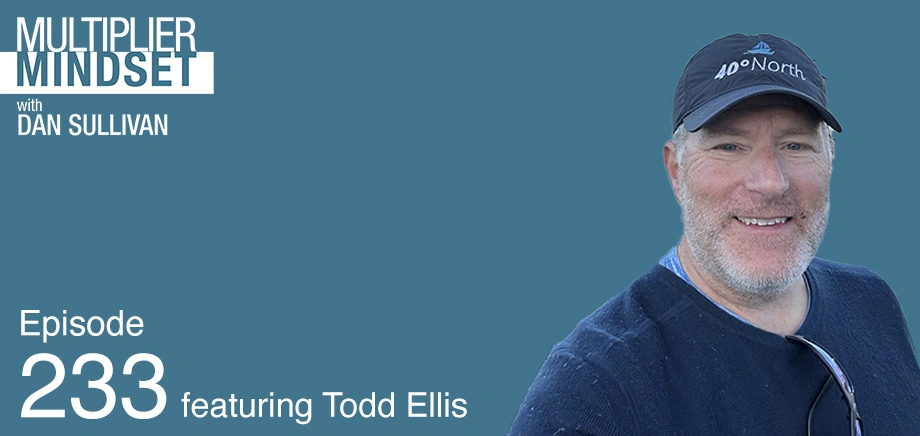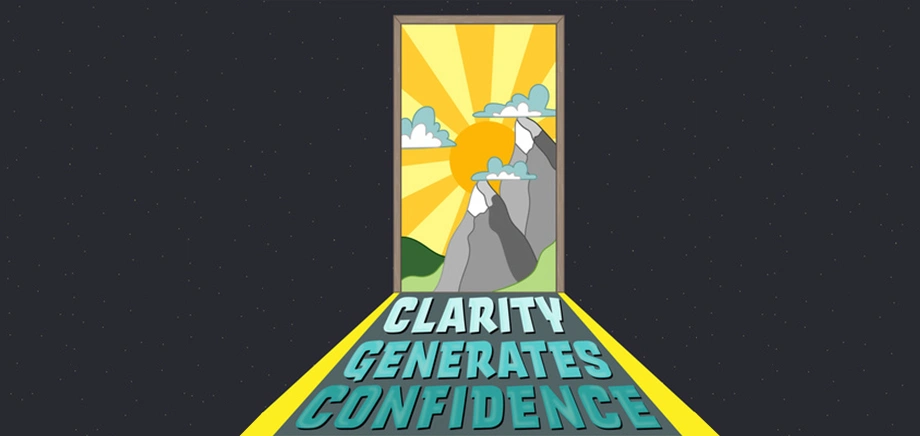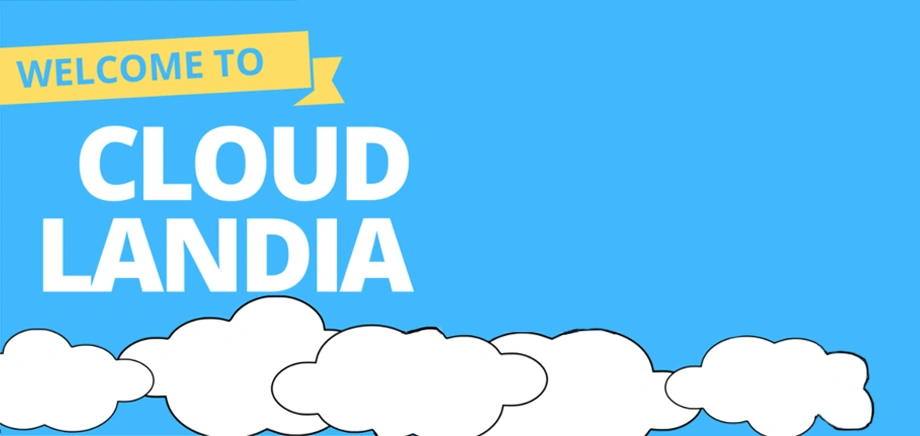Why The Best Business Decisions Happen When You’re Not Working, with Todd Ellis
May 28, 2025
Hosted By
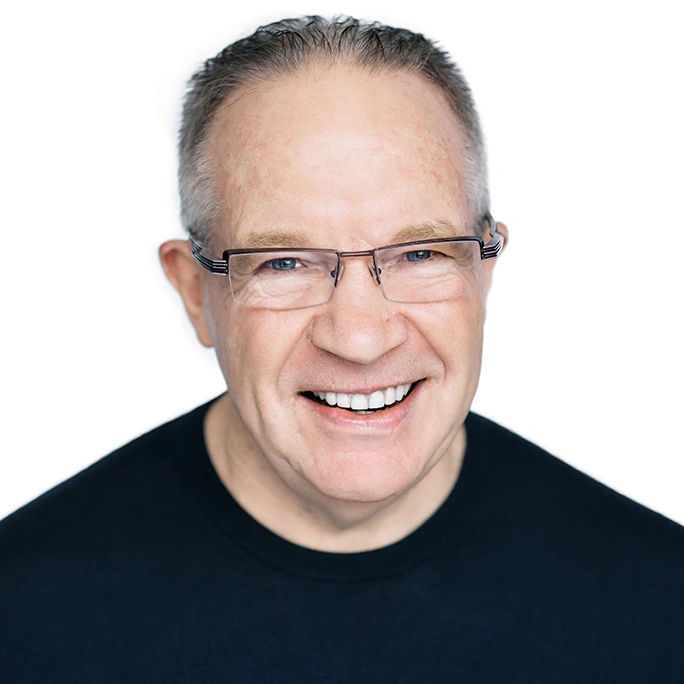 Dan Sullivan
Dan Sullivan
What if taking more time off could actually grow your business? Todd Ellis, a financial advisor and Strategic Coach® veteran, shares how a 15-day sailing voyage—completely unplugged—taught him the power of taking time off. Discover why stepping away to develop new skills builds confidence, strengthens your team, and fuels unexpected growth. The secret? A Self-Managing Company® that thrives when you disconnect.
Here’s some of what you’ll learn in this episode:
- How Todd discovered his passion for financial services—and why helping people drives his business.
- The surprising ways Todd’s company creates real impact for clients and team members.
- Why taking true time off accelerates success.
- The importance of making sure you have the capacity to handle a situation (before you’re in it).
- How Strategic Coach helps entrepreneurs and their companies grow.
Show Notes:
The more free time you take, the more your income will grow.
Taking free time flies in the face of workaholic culture, where burnout is worn as a badge of honor.
Gaining a new capability gives you a new sense of confidence.
To take time off, you must have a company that can develop and grow while you’re away.
Once you have your own company, you get to decide how you’re going to serve the public.
Many people measure their success by how many clients they have, but having fewer clients allows you to really invest in yourself.
Taking a break from technology allows you to be with your own thoughts and experience what’s around you.
A Free Day™ is a 24-hour period that's uninterrupted by any work-related activities.
When you step inside Strategic Coach, you get to be surrounded by like-minded entrepreneurs who are eager to support your growth.
Entrepreneurs share common issues, but every entrepreneur is unique.
Resources:
How Free Days Keep You On Your Side Of “The Line”
What Is A Self-Managing Company®?
Episode Transcript
Dan Sullivan: Hi, this is Dan Sullivan. I'd like to welcome you to the Multiplier Mindset Podcast. In today's episode of the Multiplier Mindset, we have a great adventure story. This is Todd Ellis. Todd is from Halifax, very beautiful city on the east coast of Canada, Nova Scotia. Todd really is talking about in his sailing adventure, he's really talking about one of the fundamental dimensions of Strategic Coach is that, unlike almost any other coaching program in the world, one of our fundamental strategies is that the more free time that you take that's really free, you're really not working, you don't have any of your electronics with you, the more your income will actually grow.
And there's a whole series of steps that are surrounded by Free Days. But it sort of goes against the current of people who are workaholics, and they take pride in being workaholics. And Todd tells a really great story about a sailing trip from Halifax to the Azores, all the work that he went through. But I just want to talk about it from the standpoint that he did something which I think is really crucial about taking Free Days, and that's to develop a new capability. And he had never sailed.
So he talks about accepting the challenge to go on this trip. And he had to really, really become very knowledgeable about sailing, about what it's like to be on a crew, and he had to take on all sorts of skills. One of the things that I really like to put the emphasis on when I take Free Days is that I develop some sort of new capability. Because not only are you taking the time off, but the new capability gives you a new sense of confidence when you come back to work. You're looking at things very different. In his case, he was pretty well cut off from all electronics throughout the entire trip.
And the other thing that the Free Days do is that you have to have a company that can develop and grow while you're away on your Free Days. So we call that a Self-Managing Company. And I've got many stories. I've got hundreds of stories of what has happened when entrepreneurs take their Free Days. And what a great reward is that not only does the entrepreneur get rejuvenated, but what happens is that their team grows when they're away on Free Days.
And the story, we've had people who have cycled completely around the world. It took half a year to circle completely around the world. We've had people who have climbed all the highest peaks on the seven continents. We've had people who have gone completely across South America, and have gone completely across Antarctica, and all these trips plus lots of other different kinds of activities besides these outdoor adventures. But it makes a huge difference when an entrepreneur knows that they can do this and they come back and business actually improves. Their team gets more skillful. Their team becomes more confident.
Babs and I in Strategic Coach, we take the equivalent of 22 weeks off every year. And the company has grown every year since we've been doing this. Our team can run the entire company while we're away. You know, they can create new possibilities, they can take advantage of new opportunities while we're away. And this seems to me to be the almost unfair reward of being an entrepreneur, that you have this company, you can take lots and lots of free time, you don't have to wait ‘till some point in the future when you retire, which is not usually a good experience for entrepreneurs. And at the same time, your team grows and your team gets lots of Free Days too.
So I just want to thank Todd for telling us this story. I'd like to have Todd as a crew member if I was taking an adventure like that. I bet the meals would be good. Great story, too, about how the funders of his trip for the charity that they did this for. So, marvelous story.
Todd Ellis: My name is Todd Ellis, the president and owner operator of National Wealth Management. And I've been with Strategic Coach now for about the last eight years. So born and raised in Dartmouth, just now live in Halifax with my wife on the lovely Halifax waterfront, father of four wonderful children. So I entered the financial services industry November 25th, 1991. And what was kind of exciting about that moment was the, when you're just kind of new in the business and you're starting out with this company and everything is new, it's exciting. You have an opportunity to go out and sell products and services, but more importantly, go out and help people. That's really what drew me to the industry was having the ability to affect people's lives and make changes in their lives.
So 1991 came about and it was really at that particular point in my life I was 21 years old, young and young in the industry, recognized also that there was a lot of older mentors in the business, so tried to kind of emulate really what they were doing in order to pick up best practices along the way. As time went on, really we were what would be called the captive agent at that particular point. The industry really didn't start to change until the late 90s and into the early 2000s. At that point in time, the agency system really was becoming more and more prominent.
So I ended up incorporating my first company called Maritime Wealth Management. It's an exciting day when you end up having something that becomes really organic. It's your own, you have your own name, your own label, your own brand. You get to decide at that point, how are you going to go out and serve the public? And what type of services are you going to offer? What's going to be your value proposition? And for me, the moments that kind of followed were really about trying to get comfortable in that set of shoes. That was 2005 when we ended up incorporating, so it ended up being a really great beginning, a pivot point more at that particular point in time.
I think early on, it was kind of communicated to us that you need to have as many clients as possible. How many clients can you acquire by way of acquisition or by way of organic growth? For a lot of people, that really attributed success. For me, I went in the opposite direction. I wanted to have deep and meaningful relationships with people. I wanted to get to understand what it is that they were really passionate about, what could we do to help them and really just walk with them during their lives. And if we could be that person that really was there when called upon, it really made for us all the difference in the world.
Also, having a smaller number of clients to service allowed us really to invest in ourselves, invest into education, invest into ways that we could provide more services to our clients by way of support, by way of making sure that, you know, no question went unanswered. I can still remember actually back in the very early days, seeing that impact felt when you're delivering a check to somebody as a result of a loss of a loved one. And you get to see the impact that that makes on their lives. And after that moment in time, you started to think that really this does make a difference, some of the products and services that we supply, whether we're insuring families or securing retirement dreams.
Well, sailing for me was a passion that came late in life. Actually, we were away on a company conference in Los Cabos and one of the things that we could do was race these America Cup yachts. And I thought, there's not going to be a better experience than this and a more unique experience. So off we went. And I came back from that, went and had a chat with my father, and I said, Dad, we have to go out and start doing some sailing together. He contacted somebody in the church, a friend of his, and he said, you know, could we come out on your boat and be crew? So it kind of began there when we went out together and got to spend a lot of time with my dad on the water, which was really quite meaningful to me.
So we went out and we were crewing on Garth Mallett's boat, who now has passed, unfortunately. And Garth was a great teacher. He just gave us one job to do and that's kind of where it began. And our role at that point for the first two years was just, you know, this is what you do. You grind the winch and that's your role. So after you started to get a little bit more curious about how the boat operated and maybe where could the boat take you, right? We started to think, you know what, I think we need a larger experience.
And so we ended up buying our own little sailboat. I can remember the first day we went out on the water. We were so excited. It was my wife and my father. We got out there in the middle of the harbor and recognized we could only steer it in one direction because we had no idea how to bring it back as a new sailor. So that was kind of a fun beginning.
But what happened afterwards was there was a crew member that came on board Garth's boat and we got to know each other quite well. And he said, Todd, I know that you're excited about a bigger adventure, a bigger experience. And he said, I'm going to do what's called the Great Circle Route. So leaving Halifax, going over to the Azores, hitting Portugal, working your way down the coastline to off of the coast of Africa, then into the Caribbean, and then back up to Halifax. And he said, would you join me for the first leg? And I was all in.
And once we kind of determined that we had this plan in mind and we kind of set a date that we wanted to depart. It really was nine, ten months of preparation. I was in charge of maybe entertainment, making sure that the morale was very important when doing a crossing because you're not seeing land for that period of time. We wanted to focus on safety. We wanted to focus on good nutrition. You know, doing meal preparation for 156 meals was key. We wanted to make sure that we also had redundancy on the sailboat because during a crossing of that nature, well, you're exposed, right?
And what's interesting was during that planning process, I thought to myself, it probably would be good to get some coaching to go out and talk to somebody in the event that I have, you know, because I've never been away from the land before. I didn't really know what that was going to feel like. And what if I had a meltdown or what if I had a nervous breakdown? And so I went and I had a chat with this gentleman and he was a psychologist. And he said, Todd, he said, most people carry around—he didn't really put this phrase very nicely—but he said, most people carry around these shit tanks.
And he said, you know what happens? He says, when sometimes our tank gets too full, it overflows. And he said, well, one of the things that you have to be prepared for is that if you get out there and you get in a stressful situation, your tank is going to overflow. He says, so we got to create capacity. And so we started to talk about creating capacity and what we could do to create capacity so that in case something came our way that we'd be prepared for it. So I felt that, you know, some of that mental preparation, that mental work was very important.
What also was really important was, as we were preparing for the trip, I had to know that when we left the shoreline, that we had the love and support of the family and friends, but also that our business was ready to take that on because we were gone for a period of five weeks. Now talk about having Free Days where there is no communication, there is no texting taking place, there is no phone calls taking place, there is no email taking place. You are basically exposed to the elements and you are really just left kind of unplugged from the rest of the world during that time until you hit land.
So we were 15 days until we hit the Azores. And what opened up for me at that particular point in time, which was quite unexpected, was the break from technology, was the experience of not having that influence in your life. You get a chance to be with your own thoughts, really have the experience of the landscape and the nature around you. We had a fun moment probably at about day 10 when the waters got a little warmer. We all decided to take a little jump into the water and it was about four and a half kilometers to hit the bottom. We kind of joked around saying, there's nobody else in the world that's ever jumped into this spot. So we had a kind of a unique moment there. It was fun.
But we got into a little bit of a struggle when we were just off the Azores. There was this storm that was chasing us down. This was one of those moments that it was good that I had prepared for, not only physically, but also emotionally, because the weather that descended on us was supposed to have gone in the other direction. And when the storm hit, the waves went from 8 feet to 10 to 12 to 20 to 25 feet. And you're in it. And there's no way of going around it. There's no way of backing out of it. You have to go through it. So we managed to take a deep breath, you know, rely on each other and our experiences and found our way, you know, moving through this storm.
And afterwards, the next day, we're kind of greeted with sunshine and dolphins are sailing beside the boat. It was just like the world opened up to us. And then flurries appeared out of almost like an island in the mist and all of a sudden it starts to appear and you can see the shoreline and feel like you've just accomplished something really, really special. It was really an incredible experience. Sometimes it's hard to describe to somebody unless you've actually lived it.
I guess one of the things that I'm again blessed and fortunate about was being able to live it and when we left we actually wanted to do something a little bit unique and special about the trip. We wanted to attach the trip to some meaning and attach gratitude to the trip. The Nova Scotia Sea School, which really was near and dear to our hearts, we wanted to do a fundraiser for the Sea School because the Sea School really allowed children that didn't have opportunities to participate in water activities or adventure and experiences on the water. So we started to blog about our experience every day and some of the kids would interact with that and we did this fundraiser as we were going across.
And one of my favorite stories about actually when we landed in one of the last islands before we went over to the mainland in Portugal, Shane and Jack were over somewhere else and I was just walking by, I was having a conversation with my folks at the time. I said, oh, I'm just going to go into this Irish pub for some lunch. So I get into the pub and I'm sitting down and, you know, after a couple of pints of liquid courage, I decide to go up to the bar and sit down and the bartender comes over and she says, well, where are you from? And, you know, how did you arrive here? And tell me your story.
And so I just went into full mode about telling her about our adventure and how we were doing this fundraiser for the Sea School and we were attaching gratitude to the children. And the expression on her face changes at that particular moment. She said, you know, Todd, she said, I used to be one of those kids. I go, oh, I said, well, thank you for sharing that with me. And she walked away and she came back and she gives me five euros. And she says, I want you to give that to the charity. And I thought, oh boy, now I have a responsibility, right?
So I said, well, I don't want you to feel like you're being taken advantage of. I said, we just got written up in the sailing magazine about our adventure. And so here's a copy of it. I'd like you to read it. And so she takes it over and she's reading it alongside of the other bartender. Now they're both looking at me, they're looking at the story, they're looking back, and the other bartender comes over and gives me five euros. So the owner is observing this, wondering why the two ladies that are working for him are all of a sudden giving money to this stranger who's just walked into the pub. They go over and they tell him what's happened and why they did what they did. And he reaches into his wallet and gives me 200 euros.
So you know what? Kindness shows up everywhere. I think the human condition is still just a marvelous, marvelous thing when people kind of open up their hearts. Well, a Free Day, and it might be a little bit different for everybody, but a Free Day at Strategic Coach, in my mind, is a 24-hour period that's uninterrupted by any sort of work or work-related activities. When we started, I guess, back into private practice when we first got incorporated, I thought to myself, and it really was an observation and a conversation that took place with my wife, and I said, you know what, we're not having a lot of quality time where we're getting these experiences either together or with the kids. I'd like to have more of that because at the time I was working 12 hours a day, five, six, seven days, sometimes a week, and it was a lot of hard work to get the company off the ground.
But one of the things that was a bit of a pivot moment for me was when I actually slowed down and started to take more time off, it was when the company started to grow. And it grew more exponentially, even more time I took off, the more it grew, which is kind of, you don't think of it in those terms. But to have that time where you're able actually to have time with your thoughts, to kind of reflect on what's taken place, to really take some time to, you know, clear some space for yourself. It's really when some of the best ideas started to flow in. Well, really to be able to take a Free Day is not easy for entrepreneurs because I think in a lot of our minds we start to equate that to lost revenue. But really, the way that we started to practice it was taking a week off a quarter.
And once we started to incorporate that into our lives, then we said, what would it look like if we added one week a year? And before you know it, we ended up getting to a point where now we take 156 Free Days off a year and in and around that range. But what was interesting was that the more time that we actually took in structured blocks, we actually had greater experiences as a result—more quality time with the family, more time away to kind of pursue some other dreams and goals outside of our day-to-day work lives. And because we incorporated that slowly, it became easier to manage.
One of the things that happened was when we first started to take Free Days, we ended up taking one week per quarter, and then we grew it each and every year by adding another week on per quarter, until we eventually ended up getting to a point where we ended up taking a cumulative time off per year of about 156 Free Days. To prepare for nine months of Free Days was an accomplishment I think unlike anything else that I've had to undertake. We had to not only make sure that the team obviously was in place to really to be able to support during that time that I was away. Obviously, there was a little bit of danger and excitement attached to the trip as well.
So I wanted to make sure that we are reassuring, obviously, family and our stakeholders that the adventure that I was about to take was one with safety in mind. And I think the interesting part about my sailing partner and his son, Shane was great. Him and I met weekly. We talked about everything that was on the list and we just continued to work through the to-do list. And where I was a little bit of a novice sailor compared to some of Shane's adventures, I had many questions and my family had many questions. So as we started to answer those questions and the list got shorter and shorter, we knew we were prepared and ready to go.
And I think had we not had that preparation, the experience wouldn't have been as exceptional as it was. Well, you would have left concerned, you would have left maybe a little bit more anxious than you should have, had you not had that time to prepare. And not having things in place for the company to be able to operate while I was away, we didn't have technology to kind of call home. We were left out there to the elements. Obviously, we had safety devices to contact Coast Guard if we needed to, but we weren't able to operate our business from a sailboat in the middle of the ocean.
Eight years in Strategic Coach has meant the world to me. It's nice to know that when you step inside Coach, you're here with a bunch of like-minded entrepreneurs. All of us are sharing some common issues and common problems, but we're all unique in our own right. And to have that open forum to kind of sit here and really share with somebody else about your current areas of growth or your concerns that you have, what can they do to maybe add some value, that collaboration has meant the world to me. It's allowed us not only to grow as a company, but for me to grow as an individual.
I'd have to say that when I first came into Coach, I probably was you know, like most entrepreneurs, maybe working too hard, didn't have enough quality time with my family and friends. Probably the business was not in a place where it's at today, which is more of a Self-Managing Company. Being able to, especially when you're in financial services, which is personal relationships, it's not as easy to have a Self-Managing Company in this particular space. So through some of the tools and techniques that I've picked up at Coach and I'm continuing to learn and hone, I guess, over the years, you know, it's allowed us to grow the business, not only by the amount of people that are within the business, but financially as well. It's been very rewarding.
I can say that our income has doubled since entering Coach. So yes, there's been a monetary return. But I think more importantly, the return for me is to be able to kind of have a different perspective on life, one whereby I don't see an end to my entrepreneurial career. I just see that as a part of the journey. Really, to be able to kind of tap into some of my own areas of Unique Ability, it's not as difficult now as it was when I first started. I guess my abilities are more honed than they have been by continuing to work on myself. So, it's given me back, I would say, or added on years to my longevity track. Not having that amount of stress that I walk with on a day-to-day basis is important because I have time to kind of compartmentalize it and take Free Days.
Yeah, I think that aha moment being on the sailboat was really to, you know, take the time to invest in yourself. Not many people really just have that amount of time where they get to have time with themselves to be able to kind of be introspective, to be reflecting on life. It doesn't necessarily have to be that you're taking an adventure like that. Sometimes it might be through quiet meditation or maybe going to a yoga class or, you know, doing some tai chi, whatever it might be. But to be able just to be in the moment was so, so important for me.
That and unplugged from technology really was an aha moment. For me to where I'm just 10, 12 hours a day in front of a computer sometimes, to not have that, I didn't realize the amount of impact that that had on my life to be connected to technology. And then when that wasn't present anymore, that became a vacation in itself.
Related Content
The Impact Filter®
Dan Sullivan’s #1 Thinking Tool
Are you tired of feeling overwhelmed by your goals? The Impact Filter is a powerful planning tool that can help you find clarity and focus. It’s a thinking process that filters out everything except the impact you want to have, and it’s the same tool that Dan Sullivan uses in every meeting.
